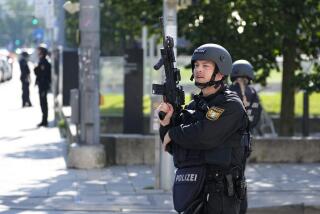Attack Outside U.S. Mission in Pakistan Kills 2, Wounds 5
- Share via
ISLAMABAD, Pakistan — Gunmen killed two Pakistani policemen and injured five other people Friday outside the U.S. Consulate in the port city of Karachi as a senior American diplomat was in the country trying to win support for a war on Iraq.
The two attackers fled, but one was arrested later, Deputy Police Chief Tariq Jamil told reporters. Last June, a suicide car bomber struck at the consulate, killing 11 Pakistanis besides himself. Members of the banned Harkat-ul-Moujahedeen, a longtime ally of Osama bin Laden’s Al Qaeda network, are on trial in that attack.
Friday’s shooting at a guard post outside the consulate occurred as U.S. Assistant Secretary of State Christina Rocca was in Pakistan’s capital, Islamabad, urging President Pervez Musharraf to back military action against Iraq.
Pakistan, a predominantly Muslim nation allied with Washington in the U.S.-declared war on terrorism, is one of 10 nonpermanent members of the U.N. Security Council and is seen as a crucial swing vote on a new resolution to disarm Iraq. Washington wants Pakistan’s vote to counter the widespread view among Muslims, including many Pakistanis, that a war with Iraq would be an attack on Islam.
A senior Interior Ministry official said Musharraf approved special security measures in January to deal with any unrest over a war in Iraq and said the government doesn’t expect a serious backlash if it supports the United States. This week, Pakistani diplomats at the United Nations indicated that the country was leaning toward voting with the U.S. in the Security Council.
The Foreign Ministry said Friday that the government hasn’t decided how it will vote.
“Pakistan will take a decision on the new resolution on Iraq at the U.N. Security Council on the basis of principles and has not signaled to anyone in support or against the resolution,” Tariq Usman Haider, an official in the Foreign Ministry, told reporters in Islamabad.
He said Pakistan was studying the resolution as well as a proposal by France and Germany to give U.N. inspectors until at least this summer to continue their search in Iraq for any banned weapons.
An Iraqi envoy met Musharraf on Friday in Islamabad, and in the meeting the president “underlined Iraq’s responsibility for complete and immediate verifiable disarmament,” according to an official statement.
After meeting with Foreign Ministry officials, Rocca also held talks with Musharraf, an army general who seized power in a 1999 coup. He is in a difficult position on the Iraq issue: He is the leader of the only Muslim nation that is a declared nuclear power, and he is fighting to control Islamic extremism.
Many Pakistanis wonder if, as a nuclear-armed country still rife with terrorist cells, they may be on the list of those to be dealt with after Iraq.
Musharraf’s government is also facing increasing criticism from U.S. forces in neighboring Afghanistan. They complain that Pakistan is still a sanctuary for Al Qaeda and fighters from the deposed Taliban regime and question privately whether Musharraf is really committed to stopping them.
A senior government official said Pakistan is expecting some favors from the U.S. before it agrees to vote for the new resolution on Iraq. Pakistan also has the option of abstaining, which could undermine Washington’s effort to show broad support for a war on Iraq.
As an example of Islamabad’s negotiating tack, the Pakistani official pointed to Turkey, a predominantly Muslim nation that has demanded billions of dollars in grants and low-interest loans in exchange for its support on the war.
“We expect a deal -- though a little less than what Turkey is demanding,” said the official, who spoke on condition of anonymity. “Some debt write-offs, grants, resumption of military aid to Islamabad and, above all, agreement with the U.S. not to back India on Kashmir would certainly ensure a ‘yes’ vote from Pakistan.”
The dispute over the Himalayan territory of Kashmir, which most Pakistanis think India is occupying illegally, is central to this country’s politics. Since the latter years of the Clinton administration, Pakistan has been worried by what it sees as Washington’s tilt in favor of India.
*
Special correspondent Zaidi reported from Islamabad and staff writer Watson from New Delhi.
More to Read
Sign up for Essential California
The most important California stories and recommendations in your inbox every morning.
You may occasionally receive promotional content from the Los Angeles Times.













